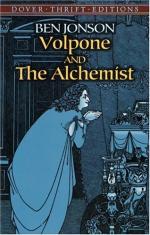|
This section contains 664 words (approx. 2 pages at 400 words per page) |

|
Religion and Society
In 1610, James I had been king for seven years. And the Anglican church, firmly re-established with the reign of Elizabeth I, was only one of several religious influences at work in Renaissance England. Among these different religions, the Puritans were of major importance to theatre-goers. Puritans opposed the theatre, since they viewed it as deceitful. Actors were, after all, assuming a role other than their own. For Puritans, acting was analogous to lying.
Accordingly, it is easy to understand why Jonson might target Puritans for satire in The Alchemist. It is also important to understand that plays were subject to censure and were reviewed by the Master of Revels, who could force revisions and censure content. Unlike twentieth-century works, seventeenth-century plays were not reviewed for sexual content or obscene language. Instead, the issue of review was religion and politics, theology governed politics in many cases...
|
This section contains 664 words (approx. 2 pages at 400 words per page) |

|




